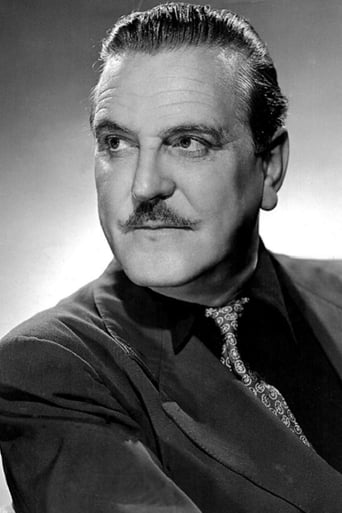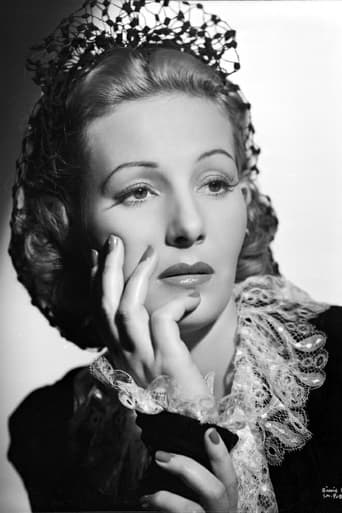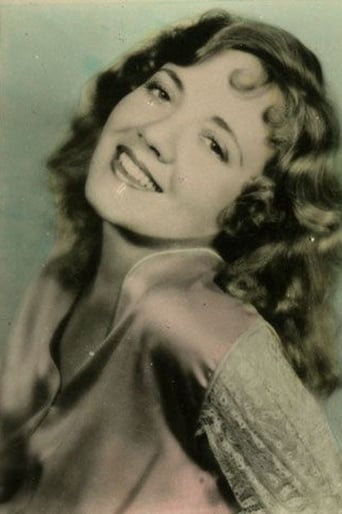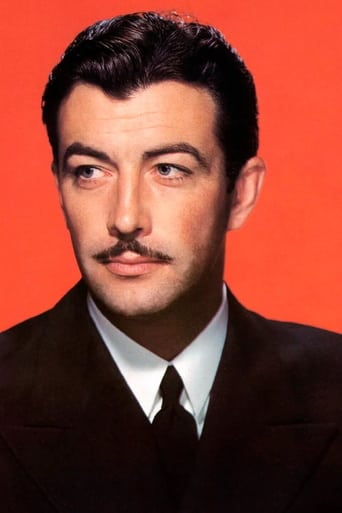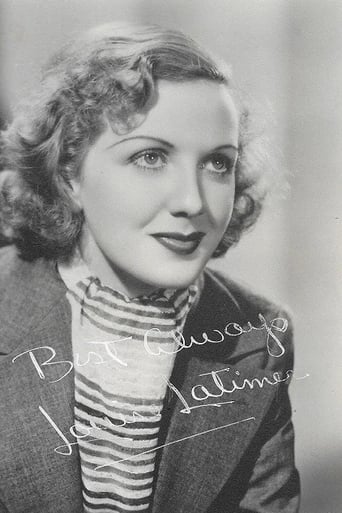Afouotos
Although it has its amusing moments, in eneral the plot does not convince.
Brainsbell
The story-telling is good with flashbacks.The film is both funny and heartbreaking. You smile in a scene and get a soulcrushing revelation in the next.
Mandeep Tyson
The acting in this movie is really good.
Kimball
Exactly the movie you think it is, but not the movie you want it to be.
boblipton
I went to today's showing of this movie at the Museum of Modern Art with mixed expectations. On the plus side, it starred some of my favorite performers of the early talkie era, including Frank Morgan (before he became typecast), Lois Wilson, the underused Binnie Barnes, Margaret Hamilton and, in minor roles, Alan Hale and Walter Brennan. It was directed by Edward Sloman, a visual stylist who would helm the next year's brilliant A DOG OF FLANDERS, and whose career would abruptly end. On the other hand, it was a soap opera, and I am not fond of those.For the first twenty minutes, my optimistic hopes were realized. True, there were no visual fireworks, and the dialogue direction was a little shaky, but a perfect portrait was offered of Frank Morgan's Joseph White, a successful man in love with his life, heading home to surprise his wife with a night out on the town to celebrate their wedding anniversary, only to be brought up short as the forgotten man at home, pushed out of every room, except when he is sent to the nether regions of the basement to deal with the cranky coal furnace. Enter Binnie Barnes.Well, we know what's going on, but this movie received Certificate 51 of the newly rewritten and enforced Production Code. As a result, we see nothing much after this. Instead, we are treated to several monologues, none of them well delivered -- Sloman's talkies always show signs of needing a good dialogue director. This movie, which started out so well, turns into what might have been a decent radio drama.I much fear that this movie is a severe disappointment, not because of what other reviewers call its old-fashioned nature, but because of its actual shortcomings. Its theme - - that even the most upright and honorable man or woman needs to be respected and loved -- remains with us. The story, though, could not be told under the Production Code: certainly not by Mr. Sloman.
mark.waltz
That's the headline of a newspaper that family patriarch Frank Morgan is reading as he is overlooked again by his wife and children after trying to get her to go to the theater with him and turned down because they are throwing a party. Wife Lois Wilson says he knows how much the children depend on her, but Morgan, wanting to spend some romantic, alone time with her, as usual gets the short end of the stick and is rejected. The only one who gives him any attention in the household is, ironically, his spunky cook/housekeeper, played by none other than Margaret Hamilton. Yes, long before "The Wizard of Oz" where they shared absolutely no scenes, Morgan and Hamilton worked together, appearing in at least three films-this mid 1930's soap opera with a male leading character, another film the same year (RKO Radio's "By Your Leave" with Hamilton also as the housekeeper and Morgan as another neglected family man) and briefly in 1938's "Stablemates" where Hamilton was a passenger on a train complaining about Morgan's beauty products. Hamilton is very funny as she gets to briefly explain her own marital history. As Morgan stands on the family porch, a very attractive woman (Binnie Barnes) approaches him, looking for a family he's never heard of. It turns out she's his former employee who has held long unreciprocated feelings for him, and needing some companionship, he takes her to the theater instead. Before long, they are spending every Thursday night together, although it is insinuated that there's nothing other than a friendly get-together without becoming an affair. Oldest son Robert Taylor happens to spot Morgan heading to her apartment, and after he leaves, Taylor and his siblings (along with Taylor's girlfriend) go into her apartment after their car breaks down. Taylor is very bitter about the whole thing, but his younger siblings all begin to realize it is their neglect which has driven their father into another woman's apartment. The siblings all begin to plot different ways to bring their parents back together, but it really comes down to one thing: will they wake up and see why Morgan had to even consider spending time with another woman? This forgotten Universal woman's picture is ironic because it focuses on the husband, not the wife or mistress, with ample time for the children to begin to see things from a different angle. Twin sons (obviously very close) get to dress in a very funny elephant costume while trying to understand what has driven their father away, while the one daughter begins to see things from a more realistic sense, leaving Taylor to stew in his own bitter juices. It's all nicely staged, but perhaps a bit too nicely. Barnes has a speech to the children where she tells them the truth behind the relationship without letting on that she knows who they are. Then, she shows up at his house in the end, and gives another speech to them. Her overly noble (and extremely chatty) character is too good to be true, but in spite of all that, it's hard not to like any of the characters here.Ironically, this was remade two decades later with Barbara Stanwyck (by then the ex-Mrs. Robert Taylor) as the career woman reunited with old flame Fred MacMurray. The very same year as this, she was co-starring with Morgan in a soapy woman's picture named "A Lost Lady". The Stanwyck/MacMurray/Joan Bennett (as the wife) version seems to be the more well known version of this, given the full Ross Hunter treatment and directed by Douglas Sirk, then at the height of his popularity after "Magnificent Obsession". Both versions seem artificial in their tellings of a story which just needed a little more spice to be truly believable but they are both equally enjoyable in spite of those minor issues.
judithh-1
"There's Always Tomorrow" is an old-fashioned story of love, romance and responsibility. Frank Morgan is the under-appreciated father of five children. Despite the fact that all but one are grown they are all referred to as children. His role in the family is doormat. Morgan's wife (Lois Wilson) is obsessed with the children and barely notices her husband. The children (Robert Taylor, Louise Latimer, Maurice Murphy, Dick Winslow and Helen Parrish) are spoiled rotten. Ella the maid (Margaret Hamilton) is the only one who pays any attention to him.The film begins with a jubilant Morgan on his his way home from work on his wedding anniversary with a surprise for his wife--flowers, dinner and a musical show. His happiness is deflated as he walks in the door and discovers that his wife won't go because "the children" are having a party and would he please shovel coal into the furnace.Ignored by his offspring and unable to find a place to sit down in his own house, Morgan ends up trying to read the paper on the front porch. A roadster pulls up and a beautiful woman (Binnie Barnes) climbs the step to the porch. She turns out to be a former employee of his whom he hasn't seen in years. Ms. Barnes is the star of the movie. She is graceful, elegant and has an extraordinarily expressive face.The neglected Morgan and the glamorous Ms. Barnes rekindle an old relationship that eventually forces everyone to take a good look at themselves and try to put things right.The world of "There's Always Tomorrow" seems older than 1934. The original novel was written by Ursula Parrott in the same year but the ambiance is Victorian. One of the delights of the film is the vehicles—huge, sleek, glossy cars and a giant streetcar. The costumes are sumptuous, mainly party clothes and some masquerade apparel. This is Robert Taylor's first appearance as a Medieval knight, a role he will play with great success later."There's Always Tomorrow" was Mr. Taylor's second film, after Handy Andy starring Will Rogers. The film has three acts. In act one he smiles maniacally while participating in the "children's" revels. Act two actually lets him do some acting as he is devastated by his father's seeming infidelity. In the third act he just sulks. It is hard to believe that in one year Robert Taylor will give a splendid performance in "Magnificent Obsession" and in two years hold his own with Garbo in "Camille." Taylor and Ms. Barnes worked together twice more, in "Broadway Melody of 1938" (1937) and "Where Angels Go Trouble Follows" (1968).There's Always Tomorrow was directed by Edward Sloman and produced by Carl Leammle for Universal Studios. It was remade in 1956 with Barbara Stanwyck and Fred MacMurray.
bkoganbing
There's Always Tomorrow is an old fashioned type story that is highly unlikely to be made today. This film stars Frank Morgan who had not yet gotten down the eternally befuddled character we all know from The Wizard Of Oz and other works from MGM.Morgan is an eminently materially successful man with wife and five kids who seem to have included him out of all their plans. He's as one of his kids puts it just a checkbook, possibly a lift in a car to various places when one or any number of his kids need the car for their busy social lives.Watching There's Always Tomorrow I try to remember that when theater audiences saw it was the middle of the Depression and Morgan and wife Lois Wilson and their kids are doing really as opposed to half any given theater audience. So when an old employee played by Binnie Barnes shows up and really treats him with dignity and respect, it's not hard to see why Morgan is susceptible.Problem is the kids do find out and things get a little hairy around the Morgan/Wilson household. But everyone behaves so civilized as opposed to what would normally be happening in real life.The most uncivilized of the group is Robert Taylor, playing Morgan's oldest son and a most callow youth. This was Taylor's second feature film and he's all self righteous about Dad's indiscretion.The film also was Binnie Barnes's first American made film, she was imported over after the raves about her performance The Private Life of Henry VIII. She starts setting a standard for portraying witty sophisticates as she did on both sides of the pond.There's Always Tomorrow was remade in 1956 and I'd be curious to see that one with Fred MacMurray and Barbara Stanwyck. This is such an old fashioned tale even for 1934.
